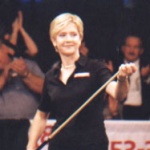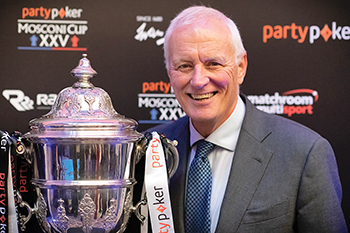The Storm Before the Calm
A week prior to the start of the U.S. Open 9-Ball Championships, players across the United States were informed that they would be required to complete a World Pool-Billiard Association Player License Agreement if they intended to play in the WPA-sanctioned event, setting off wave of questions, allegations and criticism across social media, and threatening the success of the international tournament. The announcement, posted online by the Billiard Congress of America, the North American representative federation to the WPA, seemed to catch many players off guard. The posted announcement and attached license offered no explanation as to why the license was necessary, nor why the players were finding out about the stipulation just days ahead of the country’s biggest tournament. For most players, the license was viewed as a heavy-handed measure meant to place the players at the mercy of the WPA.
“I see only negatives and no positives,” one American player posted on a Facebook thread that prompted hundreds of responses. “Nothing to help the players. Just fines and being excluded from events if they don’t comply with each and every part of this contract.”
At the core of the backlash were stipulations in the license agreement that seemed to make heavy demands of the players and threatened harsh penalties for non-compliance, like fines for missing player meetings, fines for missing publicity appearances, and restrictions on logos affixed to player clothing. Additionally, the license also prohibits players from competing in events not sanctioned by the WPA if that event meets the WPA’s sanctioning criteria.
A “slave agreement,” is how one former player referred to the license. “I’m really surprised that this has become such an issue,” responded Ian Anderson, president of the WPA. “The Player License has been working for some months now, and was a requirement at the men’s World 9-Ball Championship in Qatar in July and the China Open. I’m guessing that it is the players who would only play in one WPA ranking event a year that are so unsure about it all.”
In fact, Anderson went on to point out, virtually every foreign player attending the U.S. Open, as well as a dozen North American players (including American Shane Van Boening), had already signed the license and received a WPA Player Card earlier in the year when they participated in the World 9-Ball Championship and/or the China Open.
According to Anderson, the need for a player license arose in 2014 when promoters of a Chinese 8-ball event tried to force players to sign contracts that would have prohibited their participation in other Chinese events without approval for up to three years.
“I assured the Chinese that the WPA would have a player agreement done to cover the concerns that China claimed it had.”
Anderson also attempted to shed light on the two most contested stipulations of the player license: preventing players from participating in other events; and players being held hostage by the WPA.
“This is not about telling players where they can and cannot play,” he said. “For one, it protects organizers against having their event undermined by someone deciding it a good idea to have a tournament on the same dates as a WPA ranking event.
“Also, I think everyone has missed the very first paragraph of the license, which says, ‘Either party may cancel this license at any time.’ This means that after playing in the U.S. Open, if the player felt he was too restricted or unfairly treated because of this agreement, he could terminate his license immediately.”
Still, the fact that the announcement was made so close to the start of the U.S. Open and the WPA’s late explanation may well have had an adverse reaction on entries into the tournament. According to U.S. Open producer Pat Fleming of Accu-Stats, numerous players called with concerns and complaints.
“There were a lot of complaints,” Fleming said, as he was preparing the tournament site in Norfolk, Va. “Lots of, ‘What’s this?’ There’s not telling how many players who were on the fence decided not to sign up. All of a sudden entries stopped coming in.”
Fleming added that the field, which was expanded to accommodate 164 players this year, was full, but a number of foreign entrants cancelled due to visa issues. American players failed to snatch up the open spots, leaving the final field at 149. Fleming was hesitant to infer that those spots would have been filled had it not been for the WPA Player License.
Corner Bank 10-Ball Series Postponed
For the second time in less than two months, pool fans and players in Canada have had the rug pulled out from beneath them. First, the World Pool-Billiard Association (WPA) announced in March that the 2016 World 8-Ball Championship would be held in Toronto, Ontario, Canada, in August. A group of investors working with The Corner Bank billiard club and sports bar promised a $250,000 prize fund.
A month later, the group announced its decision to pull out of its involvement in the tournament. The WPA, according to Corner Bank owner Jim Wych, was apparently also dealing with a Chinese promoter for the rights to the World 8-Ball Championship. The Chinese promoter allegedly promised a five-year commitment to produce both men’s and women’s championships, with $300,000 prize funds for each division. (The WPA’s deal with the Chinese promoters is slated to be signed in July.) In late May, The Corner Pocket announced a six-event 10-ball series, with $25,000-added events scheduled for September, October, November, January and February. The series would conclude with a $100,000-added Grand Championship in April. A June 15 follow-up press release defined the playing format, prize fund breakdown and stated that all six events would carry Mosconi Cup points for American and European players.
Just five days later, however, Wych issued yet another statement, this time announcing the cancellation of the 10-ball series.
“It is with a great sense of disappointment,” the press release read, “that the owners of The Corner Bank in Toronto must announce that their plans for The Corner Bank 10-Ball Series are now on hiatus. Quite simply, our guarantee of funding evaporated over the weekend and has made our plans for beginning a series this September unrealistic.”
The press release added that efforts would be made to “re-engage” the financial supporters of the series. “I’m terribly disappointed,” Wych said in a telephone interview shortly after the announcement went public on AZBilliards.com. “This is a huge opportunity missed for a lot of us. There was such enthusiasm building for this series.”
Without casting blame on the WPA, Wych acknowledged that the investment group that had promised to back him may have looked at anything less than a sanctioned world championship as not impactful enough.
“A big part of the draw for the investors was the event’s draw with Asian players,” Wych said. “There is a big Asian community here. The fact that so many of the top players are Asian, and that they would likely come to Toronto was important to them. Perhaps they didn’t think the series would give them the same punch.”
Wych said he had yet to speak formally with the investors, but maintains hope that the funding is not gone forever. “When we first discussed bringing a big pool event to Toronto,” Wych said, “the response was, ‘What can we do?’ I didn’t think it hinged completely on a world championship. Bottom line is I didn’t go to contract with them to lock in the funding. I probably didn’t stay on top of it as well as I should have.” Wych added that he planned to continue his efforts to bring major tournament pool to Toronto.
“I hope to get everything back on track soon,” he said. “It’s possible we will have to reconsider going back to a single big international tournament. We’ll see.”
WPA Crowns World 9-Ball Champs
 The 2001 World Pool-Billiard Association World 9-ball champions are Allison Fisher (representing Great Britain) and Brian Naithani (Germany).
The 2001 World Pool-Billiard Association World 9-ball champions are Allison Fisher (representing Great Britain) and Brian Naithani (Germany).
Fisher, ranked No. 2 by the Women’s Professional Billiard Association, earned her fourth WPA world title by defeating WPBA No. 1-ranked Karen Corr (also representing Great Britain) 11-8 in the final held in Amagasaki City, Japan. Only one other player (Robin Dodson, with the 1990 and 1991 titles) owns multiple WPA women’s 9-ball titles. Fisher finished third last year while Corr placed second. The 2000 titlist, Julie Kelly, finished 17th, losing first to Anita Kuczma of Canada, 11-5, and then to Kyoke Sone of Japan, 11-4.
Naithani, who was the 2000 runner-up in the juniors’ contest, defeated Jung-Lin Chang of Taipei, 11-5, in the final. The defending champion, Dmitri Jungo, aged out of competition.
Also at the tournament, the WPA elected Ian Anderson of Sydney, Australia to a four-year term as its president.
Reyes Pockets Pool’s Biggest Payout
 Efren “The Magician” Reyes pulled out the largest tournament payday in the history of the game by topping Dutch phenom Niels Feijen, 15-7, in the final of theTokyo-9-Ball ¥100,000,000 International Billiard Tournament in Tokyo, Japan, on Nov. 14, to collect approximately US$160,000. Reyes emerged from a mammoth field that topped 700 players to register the victory.
Efren “The Magician” Reyes pulled out the largest tournament payday in the history of the game by topping Dutch phenom Niels Feijen, 15-7, in the final of theTokyo-9-Ball ¥100,000,000 International Billiard Tournament in Tokyo, Japan, on Nov. 14, to collect approximately US$160,000. Reyes emerged from a mammoth field that topped 700 players to register the victory.
Feijen, who added to his breakout 2001 season by finishing in second, took home approximately $64,000 after knocking out 2000 World Pool-Billiard Association World Champion Fong-Pang Chao and Australian Johl Younger to reach the final match. Earlier in the year, Feijen notched back-to-back fifth-place finishes in the WPA World 9-Ball Championships and the U.S. Open.
2001 World Championships Cancelled
The World Pool-Billiards Association has cancelled the 2001 World 9-Ball Championships for women and juniors, according to a press release from John Lewis, the WPA secretary.
The tournament had been scheduled for Nov. 14 – 18 in Ottawa, Ont., Canada, and had been awarded to “Les Productions 14.1,” the promoter that handled the 2000 event in Quebec City. No reason for the cancellation was given.
The 2002 event will be held June 26-30 in Taipei, Taiwan under the auspices of WPA-confederation member, the Asian Pocket Billiard Union, according to Lewis.
Tokyo Tourney Gets Nod From WPA
The World-Pool Billiard Association has given its blessing — and financial backing — to the much-discussed 100,000,000-yen Tokyo 9-Ball tournament scheduled for Nov. 11-14 in Japan.
Promoted by a new organization, The International Billiard Council, the prize fund is worth approximately U.S. $820,000, the highest in pool history. According to a press release from WPA treasurer John Lewis, “The WPA have no concerns about the organizers and are confident that all promises will be fulfilled.” Additionally, WPA chairman Ian Anderson announced that the world governing body will guarantee U.S. $100,000 of the prize fund.
More information about the tournament and a concurrent expo is available at www.tokyo-9ball.com.

